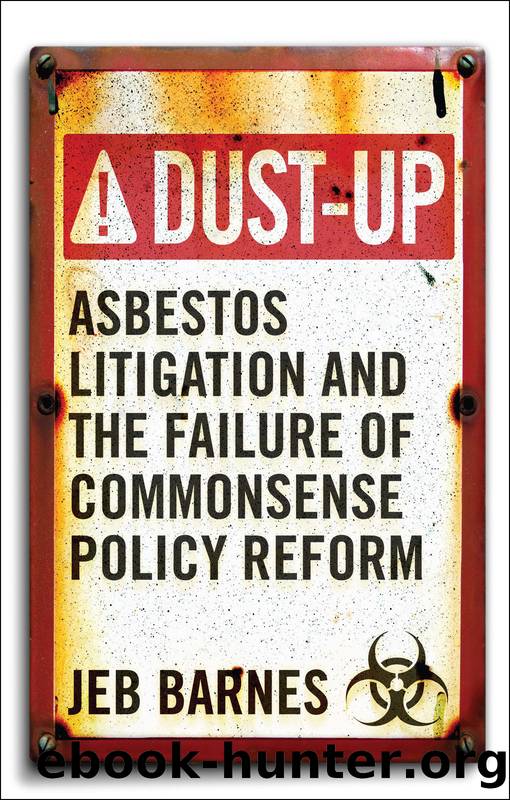Dust-Up: Asbestos Litigation and the Failure of Commonsense Policy Reform by Jeb Barnes

Author:Jeb Barnes [Barnes, Jeb]
Language: eng
Format: epub
Tags: Public Policy, Political Science, General
ISBN: 9781589017863
Google: zp1K92FfKzQC
Goodreads: 12483667
Publisher: Georgetown University Press
Published: 2011-07-08T00:00:00+00:00
SUMMING UP
The FAIR Act had a seemingly promising legislative start following the 2004 elections, but its prospects quickly faded in the Senate, because reform proponents could not muster the necessary sixty votes to waive Senator Ensignâs budgetary point of order. A variety of factors surely contributed to the demise of the FAIR Act: partisan dynamics in an age of narrow majorities and ideological polarized parties; well-organized trial lawyersâ opposition; the quality of leadership inside the Senate; and the interplay between judicial innovation and congressional inertia, especially the emergence of court-based tort reforms like the Chapter 11 trusts.
Probably the best explanation incorporates each of these factors and stresses their interrelationship. Thus, it is always difficult to pass major legislative reform, especially in an age of intense partisan rivalries, party polarization, and an increased use of supermajority procedural hurdles in the Senate. The emergence of court-based tort reforms and related judicial innovations served to complicate this already-difficult task by hindering efforts to build a broad reform coalition in Washington on replacement reform on several fronts. They fragmented stakeholder groups, created new interests that benefitted from these arrangements, and provided partial exit strategies for some groups, which reduced the sense of urgency for comprehensive reform. In this challenging political setting and tangled interest group environment, even a dedicated and skillful policy entrepreneur such as Senator Specter, could not navigate the obstacles of determined opposition, narrow majorities, divided parties, and points of order in the Senate. The tragic result is that the current system grinds on to the collective detriment of victims and businesses, even if some individual groups have done well under the existing arrangements.
This failure raises a series of broader questions: What does it teach about the usefulness of the politics of efficiency as a legislative strategy? What does it say about the prospects for institutional reform in an age of polarized parties, narrow majorities, and supermajority requirements in the Senate? And looking ahead to future studies, how should we grapple with the enormous complexity underlying todayâs policymaking? Part III addresses these issues in two installments. First, it looks at the lessons of the case for the politics of efficiency as a coalition-building strategy. Second, it considers the implications of the case for the US systemâs capacity for institutional change, the role of the courts in contemporary American policymaking, and the methods for conducting other studies of policymaking.
Download
This site does not store any files on its server. We only index and link to content provided by other sites. Please contact the content providers to delete copyright contents if any and email us, we'll remove relevant links or contents immediately.
The Social Psychology of Inequality by Unknown(3018)
The Plant Paradox by Dr. Steven R. Gundry M.D(2611)
The Writing on the Wall by Anselm Jappe(2039)
Working for Yourself by J.D. (Nolo) Stephen Fishman(1864)
Get What's Yours for Medicare by Philip Moeller(1681)
Every Landlord's Legal Guide by Janet Portman & Stewart Marcia & Ralph Warner(1663)
The First 20 Hours: How to Learn Anything ... Fast by Kaufman Josh(1661)
ADHD on Trial by Michael Gordon(1573)
Decisive by Chip Heath(1561)
Working for Yourself by Stephen Fishman J.D. (Nolo)(1525)
Drafting Contracts: How and Why Lawyers Do What They Do, Second Edition by Stark Tina L(1494)
A Practical Guide to International Arbitration in London by Hilary Heilbron(1434)
The Lord of the Rings: The Fellowship of the Ring, the Two Towers, the Return of the King by J. R. R. Tolkien(1430)
Restitution by Restitution(1424)
The Economist Aug 8th 2015 by The Economist(1421)
Intellectual Property Strategy by John Palfrey(1419)
The Economist Aug 29th 2015 by The Economist(1387)
Collusion by Luke Harding(1315)
Persuasion by Owner(1293)
